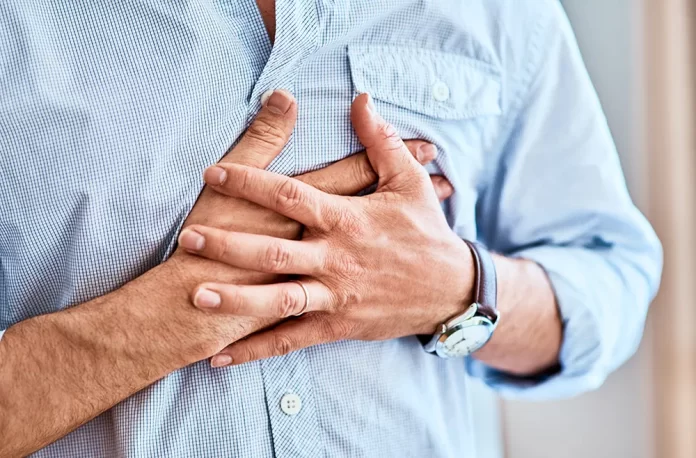While Heart Palpitation is normal when triggered by exercising, stress or medication; it can be a need of medical attention if triggered by a serious heart condition such as an arrhythmia. In this blog, we will learn the causes and symptoms of heart palpitation and when you need to be concerned.
Heart Palpitations are a sign that your heart rate has increased or changed. A change in your heartbeat is significant enough for you to notice it and be alarmed – like a fast beating or pounding. The feeling could be normal and predictable, similar to a pounding heart after a good run.
However, an abnormal pulse brought on by a modification in the heart’s electrical circuitry can also cause heart palpitations. This may cause your heart to “skip a beat,” slow down, or accelerate without any apparent explanation. Arrhythmias are these irregular rhythms that frequently need medical attention.
Table of Contents
What Causes Heart Palpitation?
Palpitations are usually brought on by changes in heart rate that interfere with the regularity or force of your heartbeat. They can feel like a racing, or fluttering sensation in the chest, which is a common occurrence
Heart palpitations can be caused by a number of factors:
So, if we talk about Heart Palpitations Symptoms, these can pop up because of stress, exercise, meds, or sometimes a health issue. Most of the time, there’s nothing to worry about. But on rare occasions, they might be a sign of something more serious with your heart, like an irregular heartbeat. That’s when you might need some treatment.
Stress and Anxiety: Stress or anxiety on an emotional level can trigger the release of adrenaline, which makes the heart beat more forcefully and quickly.
Caffeine with Stimulants: Heart rate can rise and lead to palpitations when used in combination with stimulant-containing drugs, tea, coffee, energy drinks, and supplements.
Physical Activity: Exerting oneself physically or through intense exercise can naturally raise heart rate. Palpitations may be brought on by intense physical activity or brief spurts of activity.
Nicotine: Because nicotine affects blood pressure and heart rate, smoking or using items containing nicotine can excite the heart and cause palpitations.
Dehydration: Not getting enough fluids can throw off the electrolyte balance, which can impact heart health and even lead to palpitations.
Hormonal Changes: Some people experience palpitations as a result of fluctuations in their hormone levels, especially during pregnancy, menstruation, or menopause.
Certain medical conditions: Palpitations may result from a number of medical illnesses, including anemia, hyperthyroidism, hypoglycemia (low blood sugar), and cardiac abnormalities such arrhythmias, valve problems, or coronary artery disease.
Medication and Supplements: Palpitations are a side effect of certain medications, especially those that contain decongestants, stimulants, or are used to treat thyroid or asthma problems.
Substance Abuse: Heart palpitations can result from the use of illegal drugs or excessive drinking.
While the majority of palpitations are harmless, it’s important to get medical help to rule out any underlying heart diseases or other health issues if they’re severe, persistent, or accompanied by other symptoms like dizziness, fainting, chest pain, or shortness of breath.
What Are Some Heart Palpitation Symptoms?
There are various ways to define heart palpitations. Some common symptoms you could experience in your chest are described by the terminology listed below:
- Thumping or thudding
- Rushing
- Rapid fluttering
- Flip-flopping
- Mumbling
- Skipping beats
Other symptoms may also include:
- Dizziness
- Shortness of breath
- Sweating
- Nausea
- Chest pain
- Feeling lightheaded
Heart palpitations can be unsettling in any situation, but they can also be brief changes in heart rate that are reactions to different stimuli rather than signs of a more serious condition. There are, however, certain situations in which you must seek emergency medical help or consult a healthcare provider right away.
When To Be Concerned About Heart Palpitation?
Frequent abnormal palpitations can also raise concerns even if they might not be life-threatening. Make an appointment to speak with a healthcare provider about them as they may indicate an underlying medical condition.
Click here to read more about Understand Cardiac Arrest
The following main signs are the primary indicators that your heart palpitations could be an early sign of a health issue:
- When they appear frequently and for no apparent reason, like after exercise, stress, or caffeine consumption
- When they persist long after they should have subsided
- When they are accompanied by heart attack or arrhythmia symptoms, like nausea, shortness of breath, intense anxiety, and unusual sweating; these may indicate an arrhythmia
- You should go to the emergency room of a hospital or dial 100 if you think you may be having a heart attack.
Your Aster DM Team
At Aster DM, we understand the critical importance of prioritizing the health of people with diabetes and heart problems first. Our specialized cardiovascular department is equipped with the expertise and resources required to meet the unique requirements of patients with diabetes and heart problems. Our group of exceptionally skilled doctors and healthcare experts have a thorough awareness of the complex interrelationships between these two disorders and how they affect the cardiovascular system.
















